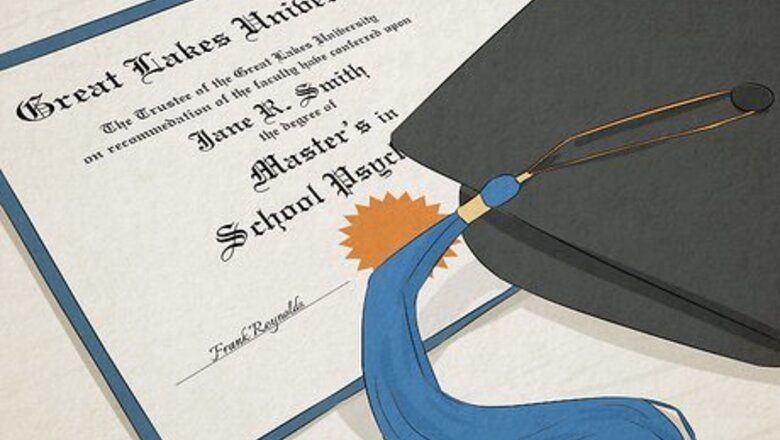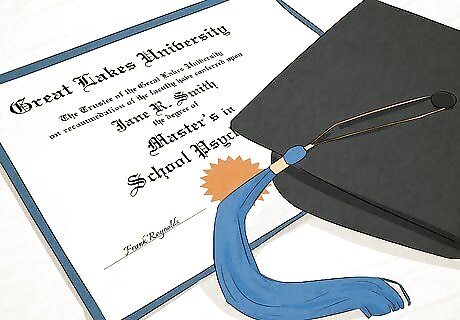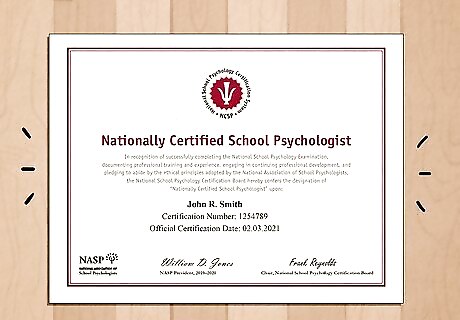
views
Can I be a school psychologist with a master's degree?

Yes, a master’s in school psychology is the minimum requirement. Before pursuing a master’s degree in school psychology, complete a bachelor’s degree in psychology or a related field. Then, complete a school psychology graduate program to earn your master’s degree in the specialty. Examples of bachelor’s degrees to pursue before your master’s in school psychology are general psychology, educational psychology, and counseling psychology.
Consider getting a PhD to open up more opportunities. It’s becoming more and more common for school psychologists to hold PhDs, so this may become a normal requirement in the future. If you want to make yourself stand out and advance in the field of school psychology, a PhD is highly recommended. If you want to work in private practice and contract yourself out as a consultant to provide school psychology services, you need a PhD as well.
What licensing and/or certification do school psychologists need?

You'll need a certificate or license to work in public schools. Obtain this by passing the Teacher Certification Test for your state, if you live in the United States. The test has a component specific to school psychologists. Note that requirements vary by state in the U.S. and may be different if you live in another country. Some states or areas might require you to complete an internship before you can work on your own in a school.
The Nationally Certified School Psychologist (NCSP) credential can help you stand out. This is a certification offered by the National Association of School Psychologists (NASP) in the United States. Check your eligibility and apply for the certification on the NASP’s website. Take the Praxis test to demonstrate your knowledge of school psychology and get certified. To be eligible for this certification you must complete a school psychology program of at least 60 graduate hours/90 quarter hours, some type of practical such as lab research or field work, and a 1,200-hour internship of which at least 600 hours have to be in a school setting.
What does a school psychologist do on a daily basis?

Conduct psychological evaluations of students. School psychologists observe, interview, and test students to evaluate their cognitive, academic, social, emotional, and behavioral abilities. They use their findings to describe the strengths, difficulties, skills, and abilities of students, as well as diagnose any learning disabilities or behavioral disorders, among other things. As a school psychologist, it’s your responsibility to provide recommendations based on these evaluations to students, administrators, parents, and teachers. For example, you might help determine where to place students with learning disabilities or who are exceptionally talented in order to best promote their education and development.
Counsel students either individually or in groups. School psychologists also meet with students to talk about academic, social, or emotional issues. After a counseling session, school psychologists usually develop a plan or an intervention solution to address the help students issues discussed. For example, you might counsel students who are experiencing anxiety or attention problems. You are also the person who counsels students if something traumatic happens that affects the school population or the broader community.
Consult teachers and administrators on various school-related issues. School psychologists consult with teachers to help them implement interventions to address learning, social, emotional, and behavioral difficulties of students. They also help administrators and teachers on a broader scale in order to create an overall safer and healthier educational environment. For example, you might consult on how to help at-risk students or deal with substance-abuse and other problems that are common in schools. You may also run mental health workshops or training programs to help educate teachers and administrators about mental health issues and social issues like bullying prevention.
What skills do school psychologists need?

Strong interpersonal skills. As a school psychologist, you’re interacting with students, teachers, administrators, and parents every day. You have to be able to effectively communicate with all types of people about sensitive issues. For example, you must be able to clearly communicate the results of your psychological assessments of students to their teachers, administrators, and parents in order to help address learning ability or social issues.
The ability to make complex decisions with sound judgement. School psychologists have to make complex decisions based on their knowledge of psychology, their evaluations of students, and other factors. You must be able to analytically think about all these factors to make the best decisions for students and the greater school community. For example, you are responsible for developing in-school and at-home intervention programs to address learning or behavioural problems of students you evaluate and counsel.
What is the difference between a school counselor and a school psychologist?

Counselors work with all students while psychologists focus on individuals. School counselors focus more on helping the whole school population in the areas of academic achievement, personal development, social skills, and career development for each and every student. On the other hand, school psychologists usually only focus on helping selected individuals who have unique cases. Students typically have a meeting with an assigned school counselor every semester to talk about their academic progress. They don’t typically see a school psychologist unless they have a specific issue or someone raises a concern about them. There may be some overlap in the work of school psychologists and counselors. For example, they might both work with teachers to develop better classroom management techniques.
Are school psychologists in demand?

Yes, the job outlook for school psychologists is very strong. Overall employment in the field of psychology was projected to grow 12% from 2012 to 2022, according to the Bureau of Labor Statistics. School psychology was one of the specialties within the broader psychology field with the best employment prospects. Keep in mind that the demand for school psychologists varies by area.
Can school psychologists do therapy?

Yes, they can provide psychological counseling for students and families. If you become a school psychologist, you’re not just limited to counseling students with academic or behavioral issues. If a student or group of students experiences some kind of trauma or distress, you can counsel them to help them get through it. You may even hold joint therapy sessions with a student and their family to talk about things that are going on outside of school. For example, if a student has a death in the family and is grieving, they can come to you for counseling. Keep in mind that you might have to obtain permission from a parent or guardian of a student to provide them with ongoing therapy.
What is the income of a school psychologist?

The average annual salary is somewhere in the range of $64,000 to $77,000. This is for in-school, full-time school psychologists with a contract for the duration of the academic year. Keep in mind that this salary range is likely to vary greatly depending on where you are based. Some schools might place school psychologists on the same salary schedule as their teachers. School psychologists also have the opportunity to work in private practice and contract their services out, which provides additional income opportunities.

















Comments
0 comment